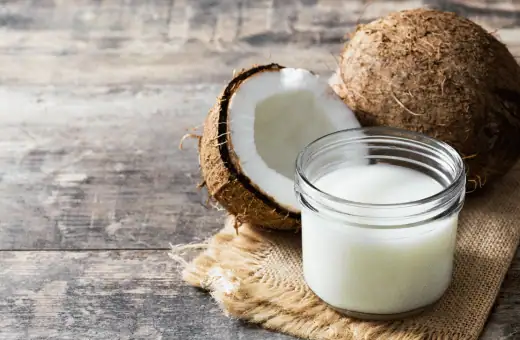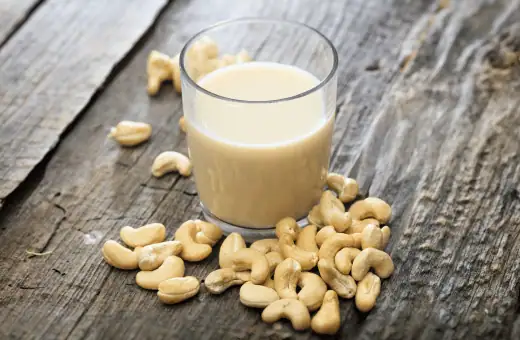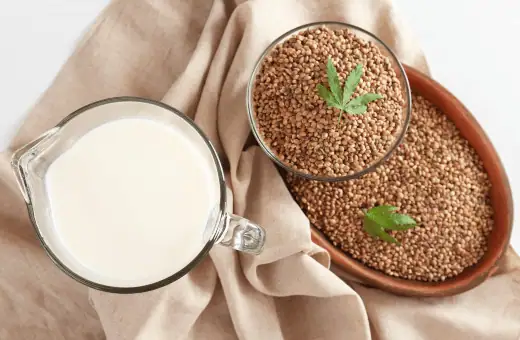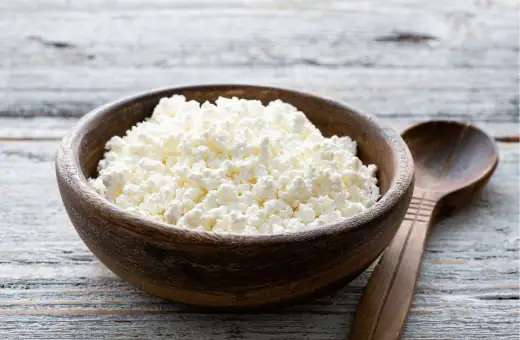Meatballs are one of the most popular comfort foods that are mostly made with milk. But what if you’re allergic to lactose or simply want to opt for healthier and vegan alternatives?
But don’t worry; you don’t have to give up on this delicious meal just yet!
With the right milk substitute, you can create mouth-watering meatballs that are free from dairy products.
In this blog post, we’ll show you the 11 best substitute milk for meatballs with proper ratios.
In short, " What Can I use instead of Milk in Meatballs?" Almond Milk, Soy Milk, Coconut Milk, Oat Milk, Cashew Milk, Rice Milk, Hemp Milk, Unsweetened Almond Milk, Greek yogurt, Ricotta cheese, and Vegetable stock.
What are meatballs, and what do meatballs taste like?
Meatballs are a type of savory dish made from ground, seasoned meat. The traditional style is a combination of beef and pork, although variations can include poultry, seafood, and vegetarian options.
Meatballs can be performed as an appetizer or as part of the main course in a meal. They can be cooked directly on the stovetop or in the oven or slow cooker.
When it comes to taste, meatballs are typically quite flavorful.
The seasoning used varies depending on the recipe and individual preference; common seasonings include garlic, salt, pepper, parsley, oregano and basil.
Cheese is also often added for extra flavor. Once cooked, they tend to have a juicy interior with a slightly crispy exterior thanks to being fried or seared before baking or simmering in the sauce.
Uses of milk in meatballs
Milk is a surprisingly versatile ingredient in meatball recipes. It not only adds flavor, but the milk proteins can help the texture of the meatballs become tender and juicy.
The moisture in milk helps to keep the meatballs from drying out during cooking and also helps them to hold their shape.
Milk also helps to bind all of the ingredients together and make them adhere better when forming into balls.
Additionally, milk contributes to the richness of flavor in meatballs as it caramelizes when heated, giving them a mild sweet-savory taste that pairs well with other seasonings and herbs.
In some cultures, they are also served cold with salads dressed with oil and vinegar-based sauces.
However, they’re served warm is perhaps the most popular way to enjoy them; they taste great with tomato sauce and pasta dishes such as spaghetti bolognese or lasagna.
Alternatively, they can be enjoyed on their own over rice or mashed potatoes – many people love their unique texture when eaten alone!
Best substitutes milk in meatballs
1. Almond Milk

Almond milk is a great choice for cow’s milk in meatballs. It has a slightly nutty flavor that compliments the meat and spices well.
Ratio or measurement: To use almond milk in meatballs, use the ratio of 1:1 with the recipe's milk quantities.
For example, if your recipe calls for 1/2 cup of milk, use 1/2 cup of almond milk instead.
2. Soy Milk
Soy milk is a popular dairy-free option to milk, and it works well in meatball recipes as well. The taste is quite neutral, so it won’t affect the overall flavor of the dish.
Ratio or measurement: Use the same ratio as almond milk for soy milk, which is 1:1.
3. Coconut Milk

Coconut milk is a great way to add some tropical flavors to your meatballs. It is also vegan-friendly and has a slightly sweet undertone that adds complexity to the recipe.
Ratio or measurement: Use 1/4 cup of coconut milk per 1 cup of regular cow's milk.
However, it’s relatively thicker than cow’s milk, so be sure to dilute it with water before using it in your recipe.
4. Oat Milk
Oat milk is another great substitute for milk in meatball recipes. It has a creamy texture that works well as a binding agent for the meatballs.
Ratio or measurement: Use the same ratio as coconut milk, that is, 1/4 cup of oat milk for every cup of cow's milk.
5. Cashew Milk

Cashew milk is a good substitute for cow’s milk, especially if you like a slightly sweet and nutty taste in your meatballs.
Ratio or measurement: Use the same ratio as almond and soy milk, which is 1:1 per cup of cow's milk.
6. Rice Milk
Rice milk is another excellent dairy-free alternative for milk in making meatballs. It is an incredible source of vitamins and minerals and is also suitable for people with nut, dairy, and gluten allergies.
Ratio or measurement: Use the ratio of one and a half cups of rice milk per one cup of cow's milk.
7. Hemp Milk

Hemp milk is a plant-based, nut-free, and gluten-free variety of milk that is perfect for vegan meatball lovers. Hemp milk has a nutty flavor and is rich in healthy fatty acids.
Ratio or measurement: Use hemp milk in a ratio of 1:1 per cup of regular milk.
8. Unsweetened Almond Milk
Unsweetened almond milk is a great milk substitute for meatballs, especially if you’re looking for a low-calorie option. It’s low in fat, has a mild nutty flavor, and doesn’t overpower the meat’s taste.
Ratio or measurement: You can use it as a 1:1 substitute for cow's milk in your meatball recipe.
9. Greek yogurt
One of the best substitutes for milk in meatballs is Greek yogurt. Greek yogurt is a thick, tangy, and creamy dairy product that can be used to replace the liquid content in meatballs.
It adds moisture and helps bind all of the ingredients together while imparting a subtle flavor boost.
Ratio or measurement: Use a 1-to-1 ratio—for every cup of milk called for, replace it with one cup of Greek yogurt instead.
10. Ricotta cheese

You can also use ricotta cheese as a substitute for the liquid in meatball recipes.
Ricotta cheese is usually made from cow’s or sheep’s milk, but it does not contain any lactose, making it suitable for people who cannot consume dairy products due to intolerance or allergies.
Ratio or measurement: To use ricotta cheese as a substitute for cow's milk in your recipes, simply measure out an equal amount of ricotta instead.
11. Vegetable stock
Vegetable stock can also be used as a substitute for dairy products like cow’s milk in savory dishes like meatballs.
Vegetable stock provides the same moisture and binding properties as cow’s milk but without the lactose content found in dairy products.
Ratio or measurement: Use one cup of vegetable stock per cup of cow's milk called for in your recipe when you make this substitution.
Conclusion on substitute milk in meatballs
Meatballs are versatile, and so are the different milk substitutes that you can use to make them.
Whether you’re a vegan, lactose-intolerant, or just looking for something new and exciting, these substitute milk options will make your meatballs more delicious and interesting.
Experiment with different types of milk and ratios to find your perfect blend of flavors, and share your culinary creations with us. Happy cooking!
FAQs on substitute milk in meatballs
Q1. What is similar to meatballs?
Meatloaf, veggie balls, falafel balls, sausage patties, and veggie burgers are all similar to meatballs. All of these options contain some type of ground-up protein-laden ingredient — whether that’s actual meat or a plant-based alternative — that is formed into round shapes and then cooked. They can be served as sandwiches or paired with sauces for a heavier meal.
Q2. Is it better to use water or milk in meatballs?
It depends on the type of meatballs you’re making. If you are making Italian-style meatballs, water is generally better to use because it will help make them light and fluffy.
However, if you are making Middle Eastern or Scandinavian-style meatballs, milk would be a better choice because it adds flavor and moisture. Regardless of which option you choose, make sure your ingredients are thoroughly mixed together for the best results.
Q3. What can I use if I do not have milk for a recipe?
If you don’t have milk for a recipe, there are several alternatives that can be used in its place. Depending on the type of dish you are preparing, some common substitutes include coconut milk, almond milk, oat milk, and non-dairy creamers.
Coconut milk is an excellent substitute for dishes that need a rich and creamy consistency due to its high-fat content. Almond milk is perfect for dishes that require lightness, as it is much lower in calories than other milk. Oat milk offers a creamy texture and a mild flavor that works well in most recipes.
Non-dairy creamers provide a dairy-like flavor without any added sugar. Furthermore, they tend to have fewer allergens than other substitutes. Additionally, unsweetened yogurt can also be used as a substitute for milk in baked goods like muffins or cakes as it provides moisture and structure without overpowering flavors.
Finally, you could even try using water as an option when making certain sauces or soups where the liquid plays more of an incidental role in the final result of the dish.
Q4. Can you use half and half instead of milk in meatballs?
Yes, you can use half and half instead of milk in meatballs. Half and half is a mixture of both parts whole milk and light cream, so it’s thicker than regular milk, which gives the meatballs a more rich texture.
Additionally, because of its fat content, it helps to keep the meatballs moist and tender while baking. However, note that this may add some calories to your dish.
Q5. Can I use water instead of milk in meatballs?
It is possible to use water instead of milk when making meatballs, but it will result in a different texture and flavor. Water does not provide the same richness and moisture that milk does, so the resulting meatballs may be less moist and tender. Additionally, milk helps bind the ingredients together better than water does.
If you do choose to use water instead of milk in your meatballs, you may want to consider adding extra fat, such as butter or olive oil, to help make up for the fat normally found in milk. You could also add other ingredients, such as breadcrumbs or mashed potatoes, to help keep your meatballs moist.
Q6. Do I need milk for meatballs?
No, milk is not necessary for making meatballs. Meatballs can be made with just ground beef, breadcrumbs, eggs and seasonings. Milk may be added to provide additional moisture and flavor to the meatball mixture, but it is not required.
Q7. Can you substitute milk for eggs in meatballs?
No, it is not recommended to substitute milk for eggs in meatballs. Eggs are a common ingredient used in the preparation of meatballs as they act as a binder, helping keep the mixture together. Milk does not act in the same way, and its liquid consistency makes it unsuitable as a binding agent.
In addition, milk may also potentially alter the flavor of your dish, making it less desirable. Eggs are also more nutrient-dense than milk and can add protein, healthy fats, vitamins, and minerals to your dish.
Q8. Can you replace heavy cream with milk in meatballs?
Yes, you can replace heavy cream with milk in meatballs. The ratio of heavy cream to replace milk depends on the desired texture of the meatballs. For a lighter, fluffier texture, use equal parts heavy cream and water in place of regular milk. If you want your meatballs to be more dense and moist, then use one part heavy cream and two parts water.
Additionally, if a recipe calls for 1 cup of milk, then you should use 3/4 cup of heavy cream plus 1/4 cup of water as a substitution. Be sure to adjust seasonings accordingly when making this substitution so that the final dish isn’t overly salty or too bland.
Q9. Can you substitute oat milk for milk in meatballs?
Yes, it is possible to substitute oat milk for milk in meatballs. Depending on the size of your recipe, you may need to adjust the amount of oat milk you use. Generally, an equal amount of oat milk can be used as a substitute for traditional dairy milk in any recipe.
For example, if your recipe calls for 1 cup of milk, you can use 1 cup of oat milk instead. Oat milk is lighter than traditional cow’s milk, so it will have less fat and calories. Additionally, when using oat milk in lieu of dairy milk in a recipe like meatballs, it will not alter the flavor or texture significantly.
Q10. Can I substitute buttermilk for milk in meatballs?
Yes, you can replace buttermilk for milk in meatballs. To get the best results, use a one-to-one substitution ratio – for every cup of milk called for in the recipe, replace it with one cup of buttermilk.
Buttermilk is thicker and additionally acidic than regular milk, so it will result in lighter and more tender meatballs. The acidity that buttermilk adds to the recipe helps break down the proteins, resulting in a softer texture. Additionally, using buttermilk will give your meatballs a slightly tangy flavor.
Q11. What can you use instead of milk in meatballs?
If you don’t have milk or prefer not to include it in your meatballs, there are other liquids that can be used to bind the ingredients. Sour cream is a popular choice and can be added in a proportion of 1/4 cup per pound of ground beef.
Alternatively, mayonnaise can be used in the same ratio. Can also use plain yogurt as an alternative to milk; the ratio is 1/2 cup per pound of ground beef. If using either sour cream, mayonnaise, or yogurt, make sure to reduce the salt content of your recipe since these ingredients already contain salt.
Q12. Can you substitute almond milk for milk in meatballs?
Yes, almond milk can be substituted for milk in meatballs. Almond milk is a great vegan alternative to traditional dairy milk, and it adds flavor and moisture to meatball recipes. When substituting almond milk for cow’s milk, you can use the same amount of almond milk as the amount of cow’s milk called for in the recipe.
For example, if the recipe is for one cup of cow’s milk, substitute it with one cup of almond milk. Additionally, you may want to add an extra tablespoon or two of oil to make sure that your meatballs do not dry out while baking.

